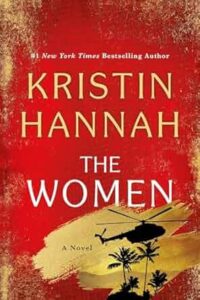Date: 27 July 2025
Location: Reynolds & Linda
Eleven of us gathered for the discussion of Kristin Hannah’s The Women (Linda and I, John and Meriam, Bob and Linda, Conan and Jaina, Jay, Lynn, and Claudia). None of us had any first hand experience with the war in Vietnam and scant second hand knowledge from friends and relatives because, as portrayed in the book, those who were there were not very disposed to talk about what happened there. I believe that all had read some or all of the book. Our discussion developed slowly, probably because of the subject matter of the book.
The principal character in the book is Frankie McGraph. She and her brother Finley grew up in a family of privilege, He went off to the Naval Academy and she was educated to be a nurse. He went to Vietnam to fight for his country, and she joined the army so she could join him there and serve her country as a nurse in field hospitals. He didn’t return, but she did.
This is another book of historical fiction and is written in two parts. Part I describes in great detail what things human beings can do to each other, when they really put their mind to it and how the men and woman involved coped with exposure to the results of this carnage, in particular in field hospitals. Shooting someone seemed to be least objectionable way of killing or maiming someone. You could also burn people up, using fire or napalm, or simply blow their flight vehicle right out of the sky. There was also the other standard weapons of war: mortars, cannons, and IEDs. There was something not considered a weapon to kill someone directly, but proved to be as lethal as other weapons, and that was Agent Orange.
Although the doctors and nurses were exposed to roughly the same gory circumstances, how they coped was an individual’s own construction and could involve booze, drugs, sex, and focusing on your work, or some combination. Some were so convinced that they were doing something really important and worthwhile that they signed up for more than one tour in country.
But all good things must come to an end, and that brings us to part II of the book – the return home and how to cope with all the baggage from the war along with attitude of friends, relatives, and the public, who had a different view of what was going on in Vietnam. Not only had the country become dysfunctional over why and what we were doing in Vietnam, but families had also, as evidenced by Frankie’s own father telling everyone back home that Frankie had taken a few years off to study abroad in Florence, instead of being proud of her for what she was doing as he had his son.
And then there is love. The author covers it in all of its forms. The love of a mother for her child; this helped get Frankie hooked on drugs. The love of friends for one another: if it wasn’t for the love between Frankie, Barb, and Ethel, Frankie would not have made it as far as she did. Then there is romantic love, combined with mendacity, which put Frankie down into a deep hole, from which it was difficult for her to climb out of.
Frankie did seek professional help when she finally recognized that she was not going be able to get better on her own, she needed help to recover from her PTSD and other problems. But, she was frequently told that “There were no women in Vietnam”, even though there were about 10,000 military women stationed there during the war.
I would not describe the book as uplifting. At times it is disturbing and sad. But it does tell a story that needed to be told. When Frankie finally realized that she could not go back to who she was, but she could move forward and be a better version of herself, she was able to move forward, and in Big Sky Country, in the middle of nowhere, she was able to establish a new her at a ranch where she could help others by giving them the help that she had finally received. I enjoyed the book.
— Reynolds
